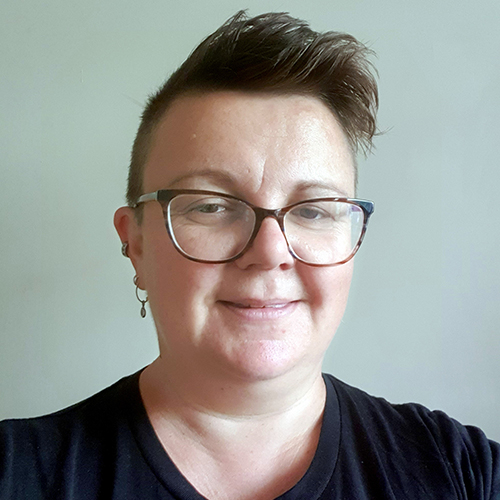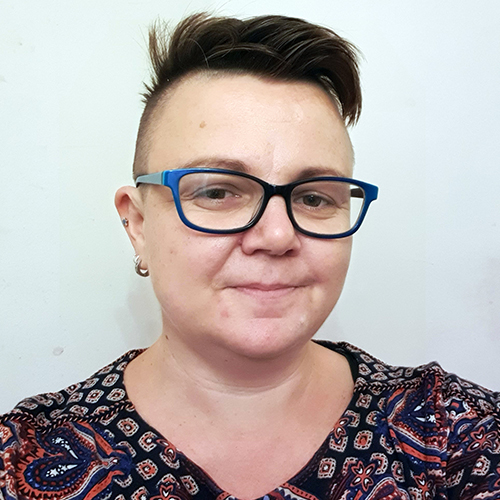 IBCLC Detailed Content Outline: Pathology Focused CERPs - Section III
IBCLC Detailed Content Outline: Pathology Focused CERPs - Section III
Access CERPs on Pathology for the IBCLC Detailed Content Outline recertification requirements. Enjoy convenient on-demand viewing of the latest Pathology focused IBCLC CERPs at your own pace.

Breaking the Silos: Understanding the Connections Between Labor Interventions and Lactation

Janiya Mitnaul Williams, MA, IBCLC, RLC, CLC is an International Board Certified Lactation Consultant, Registered Lactation Consultant, and Certified Lactation Counselor who has been supporting nursing families since 2007. She holds degrees from North Carolina Agricultural and Technical State University and Union Institute and University in Speech-Language Pathology and Audiology and Health & Wellness with a concentration in Human Lactation respectively.
Janiya is the Program Director of the Pathway 2 Human Lactation Training Program at N.C. A&T SU (NCAT P2P). She also works for the Women’s and Children’s Center at Cone Health as the Co-Coordinator for Doula Services. In 2015 she created Mahogany Milk Support Group in order to promote, encourage, and normalize nursing for Black and Brown families. That same year, Janiya also became the first person of color and Non-Registered Nurse to be hired as a Lactation Consultant for Cone Health’s hospital system.
She is most passionate about creating diversity, equity, and inclusion within the field of Lactation in order to promote better health outcomes for Black and Brown, marginalized, and underprivileged families because they have the greatest lactation barriers to overcome.
Birth and breastfeeding/chestfeeding are intimately woven together although many separate the two. One's labor and birth process however, have a direct impact on how their nursing journey begins. Naturally, most infants can independently progress through the fetal to neonatal transition and produce a baby-led latch within the first hours of life. However, the process of birth is often unpredictable and many birthing families are regularly faced with common or unexpected labor interventions that can adversely affect milk supply and the initiation and receptivity of breastfeeding/chestfeeding for the infant. Some of the most common interventions include: IV fluids, induction of labor, epidurals, and continuous electronic fetal monitoring. These maternity care practices come with unintended consequences that directly impact lactation. Furthermore, studies indicate that many of these interventions are done more for convenience as opposed to medical reasoning. In order to promote, protect and support breastfeeding/chestfeeding for birthing families, providers and other members of the healthcare team should be encouraged to work in tandem; using effective communication and facilitating open dialogue. By including families in every aspect of their birth and postpartum period, self-efficacy and confidence is increased and trust is developed, setting the foundation for increased initiation and duration of human milk feeding.

View Details / Enroll


Nekisha Killings is an equity strategist, internationally board-certified lactation consultant, and maternal and child health advocate who speaks, teaches, and facilitates on topics related to equity and dismantling bias across various sectors.
When she is not home educating 4 future world changers, she acts as a Director of Equity, Inclusion and Belonging at Lactation Education Resources and consults organizations on creating and implementing strategies to better support marginalized communities.
Nekisha holds a Masters in Public Health and penned the chapter titled Cultural Humility in the latest Core Curriculum for Interdisciplinary Lactation Support text. Nekisha is on a mission to normalize brown breasts and nipples in health education, thereby better equipping healthcare providers to accurately assess and treat people of color.
Nekisha's work is rooted in a compassion and candor that could only have been cultivated in years of supporting new parents during their first days of parenthood. Nekisha is an active duty military spouse who has been awarded the Spouse of the Year designation for her volunteer efforts supporting families.
Topic: Breast Assessment and Non-White Skin Tones - [View Abstract]
Topic: BreastSide Manner: A Patient-Centered Approach to Lactation Support - [View Abstract]
Topic: Marching Orders: Developing Practical and Impactful Care Plans - [View Abstract]
Is a red spot always a key indicator of mastitis? What about the deep purple trademark of vasospasm? How does eczema present on non-white skin? Performing a standard breast assessment may cause clinicians to overlook or misidentify key indicators of maladies in patients that are not fair skinned. Learn how you can improve your assessments and familiarize yourself with other ways to identify common conditions in patients populations that may not have been featured in your textbooks.

Breast Cancer During Breastfeeding and Breastfeeding After Breast Cancer

Fedro Peccatori is a medical and gynecologic oncologist whose clinical activities mainly include diagnosis and treatment of breast cancer, gynecological malignancies and tumors of young adults. He is Director of the Fertility and Procreation Unit within the Division of Gynecologic Oncology at the European Institute of Oncology, Milan, Italy.
His research projects deal with fertility preservation and counselling in young oncological patients, pregnancy associated cancers, pharmacological protection of ovarian function during chemotherapy, molecular characterization breast and gynecological malignancies.
He’s part of the ESMO task force Adolescent and Young Adult and ESMO faculty member for breast cancer. At present, he acts as Scientific Director at the European School of Oncology (ESO), where he’s in charge of organizing and supervising international courses and masterclasses on different oncological issues.
He has been interested in breastfeeding in cancer patients since 2009 and has published a number of papers on this issue.
Breast cancer is the most frequent malignant tumor during reproductive age.
Around 1/10000 nursing mothers are diagnosed with breast cancer every year. In this rare and difficult situation, patients and healthcare providers should be knowledgeable about the prognostic and practical implications of such an event. Chemotherapy may pass into the milk and breastfeeding is usually contraindicated during chemotherapy. Weaning should be gradual, to avoid breast inflammation and mastitis. A thorough psychological support should be given to the nursing mother to help her into the oncological trajectory.
On the other hand, the number of young breast cancer survivors is increasing and more and more patients enquire about the possibility of subsequent pregnancies and breastfeeding. The breast treated with conservative surgery and subsequent radiation is less responsive to hormonal stimulation, with reduced glandular hyperplasia and hypertrophy. Milk production is usually decreased in the previously affected breast and surgery may affect duct integrity. Nonetheless, each breast has the capability to self regulate milk production according to the baby’s suckling habits, and many evidences support the notion that one breast is enough. Specific education programs should focus on adequate baby positioning, correct latching and reinforcement of the advantages of on demand breastfeeding. Data from our group demonstrate the feasibility of breastfeeding after breast cancer, but qualified lactation counseling to support patients and caregivers is needed.

View Details / Enroll

Breastfeeding / Nursing Aversion and Agitation (BAA) in breastfeeding mothers

Zainab Yate is a Biomedical Ethicist, with a specialist interest in infant feeding. Zainab is Vice Chair and named qualitative lead on a paediatric flagged Research Ethics Committee Panel for the Health Research Authority (HRA) in the UK, reviewing research protocols for over a decade. Zainab's previous working background is in Public Health and Commissioning the National Health Service (NHS) in the UK. She had also been a volunteer breastfeeding peer supporter with the NHS for a number of years, is the owner-author of the resource site for mothers and healthcare practitioners on Breastfeeding / Nursing Aversion and Agitation and author of "When Breastfeeding Sucks".
Topic: Breastfeeding / Nursing Aversion and Agitation (BAA) in breastfeeding mothers - [View Abstract]
Topic: Navigating the Future: Bioethical Challenges in Anticipated Integration of AI in Lactation and Breastfeeding Services - [View Abstract]
Topic: Research Ethics & Infant Feeding: How to Utilise the Four 'D's of a Brief Assessment - [View Abstract]
Aversion to breastfeeding or agitation while breastfeeding is known to occur in some women who breastfeed while pregnant, or who tandem feed a newborn and a toddler. However, it is a little researched area, and the paucity of published literature around breastfeeding aversion and agitation reveals a significant gap in the literature. My presentation presents the findings of an exploratory online survey that sheds light on what appears to be a commonly experienced phenomenon of aversion and agitation whilst breastfeeding, which varies in form, severity and duration. BAA is characterised by feelings of anger or rage, a skin crawling sensation and an urge to remove the suckling infant, but can also be feelings of agitation and irritability whilst the infant is latched. Mothers who experience BAA still continue to breastfeed, but have feelings of guilt and shame about BAA and are often confused about having feelings of BAA. Research is needed to understand the reasons for BAA, its causes, triggers and strategies to minimize the experience in breastfeeding mothers.

View Details / Enroll

View Details / Enroll

Breastfeeding and Neonatal Abstinence Syndrome

Amber Valentine is a Speech-Language Pathologist who graduated from the University of Kentucky with her MS in Communication Disorders. She is a Board Certified Specialist in Swallowing and Swallowing Disorders and an International Board Certified Lactation Consultant, as well as a Certified Neonatal Therapist (CNT). She worked for Baptist Health Systems, Inc for 8 years before moving to Florida where she worked for Wolfsons Children’s Hospital and Mayo Florida. She is now back in Kentucky working for Baptist Health Lexington. She has experience in adults and pediatrics with feeding and swallowing difficulties including: bedside swallow evaluations, Modified Barium Swallow studies, FEES, and pediatric feeding evaluations including NICU. She has experience with head and neck cancer patient including evaluation and treatment of swallowing difficulties, PMV use, and voice after total laryngectomy including TEP. She has provided guest lectures for the University of Kentucky, Eastern Kentucky University, and the University of Louisville on feeding and swallowing topics. She has presented at the hospital, local, state, national, and international levels on pediatric feeding/swallowing and breastfeeding.
Topic: Breastfeeding Medically Complex Infants in the Neonatal ICU - [View Abstract]
Topic: Building a Successful Breastfeeding Program in the NICU: Challenges and Practical Solutions - [View Abstract]
This presentation is designed to discuss the role of feeding therapy, breastfeeding, and family dynamics with infants with neonatal abstinence syndrome. These baby/family dynamics can be complex situations and feeding difficulties are extremely common. Breastfeeding education/information can be implemented prior to birth along with other education for families to promote more infant/family bonding and reduce stress of being born in substance exposure. Breastfeeding dramatically reduces stress signs in infants exposed to substances neonatally. Working together as an interdisciplinary team, we can set these families up for more successful feeding opportunities and decreased stress in developmental care.

View Details / Enroll

Breastfeeding as a Prevention Strategy for Speech Language Disorders

Lina Mazzoni is a Lactation Consultant, IBCLC with a Bachelors Degree in Speech and Language Therapy. Since 2013 she has been working primarily with children and specialized in the treatment of sucking, swallowing and feeding disorders. In 2019 she became a Lactation Consultant to be able to work equivalent with the children and the mother. As a working mom she worked part time as a Lactation Consultant in a hospital in Hamburg, started her own privat practice in 2019 and since october 2021 she works exclusively in her private practice as a lactation consultant and SLT. She also works as an Instructor in lactation education and further education regarding feeding developement and disorders . Lina has two children and lives with them and her husband in Hamburg, Germany.
Topic: Sucking Disorders in Children with Neurological, Muscular, Genetic or Anatomical Diseases - [View Abstract]
The prevention and early treatment of diseases is part of a Speech and Language Therapist's working field.
The question is, at what point can SL Therapy have a preventative influence, what are the advantages of early consultations and treatments and what significance does a nursing and lactation consultation have in this context. Asha and Fletcher (2005, S.1) called a SL Therapist and a Lactation Consultant a "Baby's feeding dream team", so the combination of these two professions might be a good way to facilitate difficult breastfeeding relationships and reduce SL disorders over the years.
Breastfeeding is the physiological way to feed a baby. It supports the Mother-Child-Bond and sets the foundation for the undisturbed organic, sensorial, motoric, cognitive, oral and social development. If there is a problem with the ingestion of food (oromotor dysfunction or dysphagia), the topic of breastfeeding tends to move to the background. But what if breastfeeding can be used as part of the therapy? Promoting early SLT and by supporting the breastfeeding and preventing the use of artificial teats, which can have a negative influence especially on the oromotor and muscle development, the outcome might improve.

View Details / Enroll

View Details / Enroll

Breastfeeding for Maternal Cardiovascular Health: A Review of the Evidence

Sonia Semenic is an Associate Professor at the Ingram School of Nursing, McGill University (Montreal, Quebec, Canada) and a Nurse Scientist at the McGill University Health Center. After many years of experience as an IBCLC and Clinical Nurse Specialist in maternal-child health, Sonia completed a PhD in Nursing and postdoctoral training in community health. Her research aims to better understand the process of knowledge translation (KT) in perinatal health, with a particular focus on the implementation of evidence-based practices to protect, promote and support breastfeeding. She currently co-leads the Knowledge Translation Platform for the Quebec Nursing Intervention Research Network, and teaches graduate courses on knowledge translation in nursing practice.
Topic: Moving from Evidence to Practice: Knowledge Translation and Breastfeeding Support - [View Abstract]
There is mounting research evidence that lactation is associated with both short- and long-term benefits for maternal cardiovascular health. Observational studies have found that lactation can lower maternal blood pressure, risk of metabolic syndrome, and other markers of cardiovascular risk (Rameez et al, 2019; Qu et al, 2018), and a recent meta-analysis involving more than 1 million individuals concluded that breast/chest-feeding is associated with a 10% lower risk of fatal and non-fatal cardiovascular disease or stroke in later life (Tschiderer et al, 2022). Potential explanations for the cardioprotective impacts of lactation include the role of lactation in postpartum lipid metabolism (Countouris et al, 2020), beneficial effects of oxytocin on the cardiovascular system (Jankowski, 2020), and the role of oxytocin in the stress response (Brunton et al, 2008). However, the relationship between lactation and cardiovascular outcomes is complex and may be mediated by such factors as obesity and metabolic syndrome (Stuebe, 2015). This presentation will review the latest research evidence related to the association between lactation and cardiovascular outcomes, and provide guidance on how to promote breast/chest-feeding for maternal cardiometabolic health.

View Details / Enroll

Breastfeeding Medically Complex Infants in the Neonatal ICU

Amber Valentine is a Speech-Language Pathologist who graduated from the University of Kentucky with her MS in Communication Disorders. She is a Board Certified Specialist in Swallowing and Swallowing Disorders and an International Board Certified Lactation Consultant, as well as a Certified Neonatal Therapist (CNT). She worked for Baptist Health Systems, Inc for 8 years before moving to Florida where she worked for Wolfsons Children’s Hospital and Mayo Florida. She is now back in Kentucky working for Baptist Health Lexington. She has experience in adults and pediatrics with feeding and swallowing difficulties including: bedside swallow evaluations, Modified Barium Swallow studies, FEES, and pediatric feeding evaluations including NICU. She has experience with head and neck cancer patient including evaluation and treatment of swallowing difficulties, PMV use, and voice after total laryngectomy including TEP. She has provided guest lectures for the University of Kentucky, Eastern Kentucky University, and the University of Louisville on feeding and swallowing topics. She has presented at the hospital, local, state, national, and international levels on pediatric feeding/swallowing and breastfeeding.
Topic: Breastfeeding Medically Complex Infants in the Neonatal ICU - [View Abstract]
Topic: Building a Successful Breastfeeding Program in the NICU: Challenges and Practical Solutions - [View Abstract]
Feeding is the most complex task of infancy, even in term babies with no complications. There are many diagnoses, conditions, syndromes, and co-morbidities that can impact feeding in neonates and infants. This talk will briefly highlight many of those, but we will focus on three specific populations of interest –Cleft lip and palate, Infants of Diabetic Mothers, and Down Syndrome. We will discuss the specific implications these conditions can have on feeding, why these infants may have difficulty, and the classic symptoms one could expect to see. The differences between delayed and disordered feeding will also be addressed. Strategies and adaptions for both breast and bottle feeding will be discussed. Positioning, nipple flow rate, and external strategies will be explained. Case studies will be shared at the end of the presentation.

View Details / Enroll

View Details / Enroll

Breastfeeding Twins and Triplets: Supporting Families During Their Breastfeeding Journey

Kathryn Stagg is mum to 4 boys, twins and 2 subsequent singletons. She trained as a breastfeeding peer supporter and volunteered in the groups for years in and around Harrow, NW London, UK.
Kathryn caught the breastfeeding support bug and decided to further her knowledge training as a Breastfeeding Counsellor with the Association of Breastfeeding Mothers and then qualifying as an IBCLC 5 years ago.
Kathryn started Breastfeeding Twins and Triplets Facebook group almost 8 years ago and it now has over 9000 members. It has recently been made into a UK charity. Kathryn is passionate about delivering high quality breastfeeding support to as many twin and triplet families as possible, creating resources and educating health care professionals and breastfeeding supporters. She runs a small private practice and continues to teach music part time, her original career path. Kathryn is the author of Breastfeeding Twins and Triplets; a guide for professionals and parents.
/p>
Topic: Don't Let Us Fool You: Breastfeeding in Late Preterm and Early Term Babies - [View Abstract]
This session will help you understand the challenges of a multiple pregnancy and birth. Discover preparations that can help ease stress and increase success in lactation. Learn how to support families experiencing premature birth. You will understand the best way to help parents establish breastfeeding their multiples, even with late preterm/early term birth. This session will help attendees gain and understanding of how to navigate the challenges of breastfeeding multiples and how to support families effectively during the different stages of their breastfeeding journeys.

View Details / Enroll

View Details / Enroll


Barbara D. Robertson, IBCLC, has been involved in education for over 34 years. She received a Bachelor’s degree in Elementary Education in 1988 and her Master’s in Education in 1995. Barbara left teaching elementary students in 1995 to raise her two children. Barbara is now the Director of The Breastfeeding Center of Ann Arbor and of the brand new business LactaLearning.
The Breastfeeding Center of Ann Arbor will still continue to serve breast/chestfeeding families and now LactaLearning will be dedicated to all of Barbara’s professional lactation trainings. Barbara has developed two 95 hour professional lactation training, a group training and a completely self study training with Nancy Mohrbacher. Barbara’s idea of creating professional book groups has exploded with her hosting Making More Milk with Lisa Marasco, Supporting Sucking Skills with Cathy Watson Genna, Breastfeeding Answers, 2nd Edition with Nancy Mohrbacher, and new for the fall, Safe Infant Sleep with Dr. James McKenna. Barbara will be hosting a one day online conference in the fall with Lisa Marasco and Cathy Watson Genna using all of her tech savvy skills to make this a one of a kind experience. Barbara is also a speaker for hire on a wide variety of topics including Motivational Interviewing. Barbara volunteered for the United States Lactation Consultation Association as the Director of Professional Development for 4.5 years.
She just retired as Associate Editor for Clinical Lactation, a journal she helped create for USLCA. Barbara has free podcasts, a blog, and Youtube videos which can all be found on her websites lactalearning.com and bfcaa.com. She has written many articles as well. She loves working with parents and babies, helping them with breast/chestfeeding problems in whatever way she can.
Topic: Breastfeeding: Baby’s First Milestone - [View Abstract]
Topic: Clinical Assessment and Management of Low Milk Production - [View Abstract]
Topic: Deconstructing Online Messaging: Ethical Considerations - [View Abstract]
Topic: Milk Sharing and Milk Banking: Building Knowledge for Better Outcomes - [View Abstract]
Topic: The Baby's Not Gaining Weight! Now What? - [View Abstract]
Topic: The Great Nipple Shield Debate - [View Abstract]
Breastfeeding is widely acknowledged as being the healthiest way to feed an infant for at least two years. In the United States of America, the CDC 2014 Breastfeeding Report Card states that 79.2% of mothers start out breastfeeding. However, as the babies get older, these numbers plummet. Only 49.4% of these babies are receiving any breastmilk by 6 months of age. We know from the literature that the primary reasons mothers stop breastfeeding in these early months are pain and worrying about their breastmilk supply. These are problems with solutions if the proper support is in place. Why is this support lacking? Is it because for all of the talk, “breast is best”, the importance of breastfeeding is not really valued? What if successful breastfeeding was reframed into a milestone? Baby’s first milestone? This presentation will explore other milestones, walking, talking, and learning to read, and what happens if babies and young children are not reaching these markers in a reasonable time frame. What support systems are in place to help these milestones be achieved if babies are faltering? The possible reasons for a baby not being able to breastfeeding and possible solutions will then be examined from the lens of having proper support systems in place.

View Details / Enroll
















